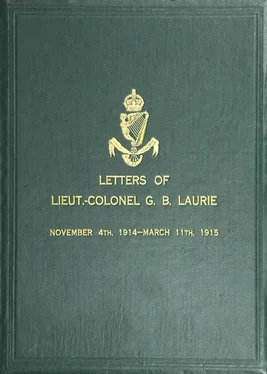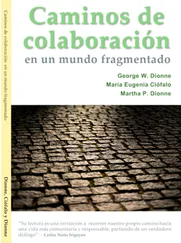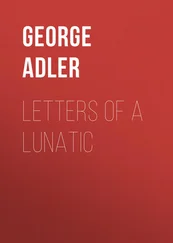George Laurie - Letters of Lt.-Col. George Brenton Laurie
Здесь есть возможность читать онлайн «George Laurie - Letters of Lt.-Col. George Brenton Laurie» весь текст электронной книги совершенно бесплатно (целиком полную версию без сокращений). В некоторых случаях можно слушать аудио, скачать через торрент в формате fb2 и присутствует краткое содержание. Город: Aldershot, Год выпуска: 1921, Издательство: Gale & Polden, Ltd, Жанр: Биографии и Мемуары, prose_military, на английском языке. Описание произведения, (предисловие) а так же отзывы посетителей доступны на портале библиотеки ЛибКат.
- Название:Letters of Lt.-Col. George Brenton Laurie
- Автор:
- Издательство:Gale & Polden, Ltd
- Жанр:
- Год:1921
- Город:Aldershot
- ISBN:нет данных
- Рейтинг книги:5 / 5. Голосов: 1
-
Избранное:Добавить в избранное
- Отзывы:
-
Ваша оценка:
- 100
- 1
- 2
- 3
- 4
- 5
Letters of Lt.-Col. George Brenton Laurie: краткое содержание, описание и аннотация
Предлагаем к чтению аннотацию, описание, краткое содержание или предисловие (зависит от того, что написал сам автор книги «Letters of Lt.-Col. George Brenton Laurie»). Если вы не нашли необходимую информацию о книге — напишите в комментариях, мы постараемся отыскать её.
Letters of Lt.-Col. George Brenton Laurie — читать онлайн бесплатно полную книгу (весь текст) целиком
Ниже представлен текст книги, разбитый по страницам. Система сохранения места последней прочитанной страницы, позволяет с удобством читать онлайн бесплатно книгу «Letters of Lt.-Col. George Brenton Laurie», без необходимости каждый раз заново искать на чём Вы остановились. Поставьте закладку, и сможете в любой момент перейти на страницу, на которой закончили чтение.
Интервал:
Закладка:
Yours ever,
G.B.L.
As to school for Hal, you have done quite rightly. Mrs. Napier has a pet school for boys, kept by a cousin of hers, I fancy, that ought to be a fairly useful one.
G.B.L.
“CHRISTMAS IN THE CRIMEA.
“How it was Celebrated near Balaclava in 1854.
“By Lieut.-General Laurie, C.B., M.P.
“In some of his Christmas annuals Charles Dickens delighted to portray the misanthropic grumbler who hated to see others enjoy themselves, and always laid himself out to be especially miserable at Christmas time, exaggerating the effects of the season by assuming a frozen aspect, and like an iceberg, chilling all around him; yet as the same iceberg when swept into the Gulf Stream finds the surrounding air and water by which it is enveloped will not admit its retaining its frigid isolation, it gradually melts and mixes with the warmer current, so Dickens brought his surly and crabbed man in contact with those who had set themselves to see everything under its brightest aspect, and under these softening influences he gradually thaws out and becomes the merriest amongst the merry, carried away by the joyous influences that are associated with the keeping of Christmas. And in all English-speaking countries, and especially in our old home, England, it is looked upon as a season to be given up entirely to pleasure in the present and bright hopes for the future. Memory takes me back to a Christmas which hardly came up to the ideal, and the contrast of then and now, of trials and miseries endured then, as compared with present comforts, may make us more satisfied with, and thankful for what we now enjoy. Twenty-nine years ago England had contributed as her share of the Crimean invading force over 35,000 men, of whom a scanty 8,000 were on Christmas Day, 1854, available for duty; many of the remainder had helped to fill the huge trenches hastily dug for graves on the fields of Alma and Inkerman, or slept below the innumerable little mounds which surrounded our camp hospitals, and inside the canvas walls of these the number of sick exceeded the total of those who still stood in the ranks, although none were received into hospital as long as they were able to carry themselves and their rifles. During the greater part of December we had been reduced to half rations, and sometimes to no meat at all; half a pound of biscuit; one blanket, and threadbare suit of uniform contributed but small support and protection to meet a climate not unlike that of Nova Scotia. And we were entirely without fuel, other than the roots of small alder bushes, which were grubbed up with pickaxes carried off from the trenches, and sometimes the pickaxe handles were used to warm a canteen of water for tea. But soon these became so scarce that we were without a single fire in the camp of my regiment for three days. In spite of all, however, Christmas was at hand, and we all set ourselves to be jolly. Even the celebrated Mark Tapley would have considered the circumstances were fairly creditable. The authorities also considered it incumbent on them to make an extra effort, and it was announced with great pride that the commissariat had secured some live cattle in honour of the season, and we were to receive an issue of fresh meat. But this was the extent of their ambition, and their pride met with a fall, for, after waiting till after three o’clock, our pioneers, who drew the rations, returned with the melancholy intelligence that there was nothing for us that day. ‘The Zouaves,’ so said the commissariat officers, ‘had stolen the bullocks.’ It is often mentioned as one of the advantages of live cattle as food for an army that they require no transport, but carry themselves. But we learnt that there is another side to this quality—they sometimes carry themselves away, as they did on this occasion. Whether our gallant allies really ate our dinner as well as their own that Christmas Day I know not, but African warfare had taught them to take care of No. 1, and they formed a convenient and not unlikely peg on which to hang the deficiency; and deficiency there was, for our supply department, relying upon their fresh meat, had not brought up any salt meat from Balaclava, and we were left with only our ration biscuit for our Christmas dinner. Just as we received this pleasant intelligence the orderly sergeant handed me the order book warning me I was for guard duty in the trenches that night. Our regiment, which had gone out from Edinburgh in the spring over 1,000 strong, and had received a reinforcement of nearly 100 men, was at this time reduced to 68 men available for duty. So but one captain and one lieutenant (myself) were detailed to take charge of this poor remnant of what had been, three months before, a magnificent battalion. Captain Patrick Robertson, well known to Haligonians as Colonel Robertson-Ross, Adjutant-General of Canadian Militia, was to be my companion. A new colonel had just been sent to us from a West Indian regiment, who took as much interest in his new command as if he had served all his life with us, and employed his chargers and his grooms to transport any possible comforts for his men. Six months afterwards he was struck down when directing the fire of his men on the Russian gunners to keep down their fire and cover our attack on the Redan. By chance he heard us warned for guard, and at once went to his tent and returned with a ham knuckle. ‘It is all I have,’ he said, ‘but those going on duty must have the first chance of some food on Christmas Day. Sit down on your rug and make the best of it.’ He was in earnest, so we ate up his dinner and polished the ham bone; but I had determined to keep Christmas as an Englishman should with a real plum pudding. I had collected the ingredients in the course of a couple of trips among the Maltese and Greek settlers at Balaclava and from the stewards of some of the transports; a few raisins, a little sugar, some butter (so called by courtesy); and of course my ration rum came into play. I could not get any flour, so purchased some biscuit at Balaclava. It was mouldy and full of weevils, and had been condemned as ship’s stores and sold to some camp followers, but to us at half a crown a pound it was a treasure. I pounded a quantity of this as fine as possible, and mixed the material in my tin shako case, which did duty as bucket, etc., and tied them up in one of my two towels, and, having secured a tent bag full of freshly dug alder roots, the pudding was put on to boil. As we were going on guard, dinner was early, perhaps too early for the pudding. We had no holly, and could not spare spirits enough to make a blaze, but my servant brought in the pudding quite as triumphantly as if we had been in baronial mansion in old England. It was reserved for me to open the towel, which I did with no little pride at having the only plum pudding in camp. I had buttered the towel so that it should not stick to it; it did not, but it did not stick together either. It would not stand up, but fell apart like very stiff porridge. I believe it wasn’t bad to eat, but it wasn’t exactly what we understand to be plum pudding. My vanity was cruelly mortified after all my efforts to excel. I have never attempted to make another plum pudding. The Russians were considerate that night. They gave us very little annoyance, and Robertson and I walked up and down in rear of the trenches where our weary and worn-out men were lying quiet, getting a welcome rest in a half-wet, half-frozen ditch. We talked of home and how we had spent other Christmases, but I do not think we either expressed or held any other thought for the future than when we should bring our discomforts to an end and wind up the siege by a determined attack on Sebastopol. Little we expected that after long separation our paths would again come together in America, serving the Canadian Government in the organization of its militia. And amongst the sad memories which intertwine with the pleasures of this present Christmas is that of my poor comrade, a brilliant out-post officer and a gallant man, who, after facing every form of danger as a soldier should, died a few months since from violent seasickness, brought on in crossing the English Channel. Memory conjures up the past at this season. Friends who have left us are present in spirit. We associate the past with the present more at Christmas than at any other time of year. It colours our thoughts and influences our acts unknown to us, and brings out kindly feelings and hope, as much in 1883 as my reminiscences show it did in 1854.”
Читать дальшеИнтервал:
Закладка:
Похожие книги на «Letters of Lt.-Col. George Brenton Laurie»
Представляем Вашему вниманию похожие книги на «Letters of Lt.-Col. George Brenton Laurie» списком для выбора. Мы отобрали схожую по названию и смыслу литературу в надежде предоставить читателям больше вариантов отыскать новые, интересные, ещё непрочитанные произведения.
Обсуждение, отзывы о книге «Letters of Lt.-Col. George Brenton Laurie» и просто собственные мнения читателей. Оставьте ваши комментарии, напишите, что Вы думаете о произведении, его смысле или главных героях. Укажите что конкретно понравилось, а что нет, и почему Вы так считаете.












